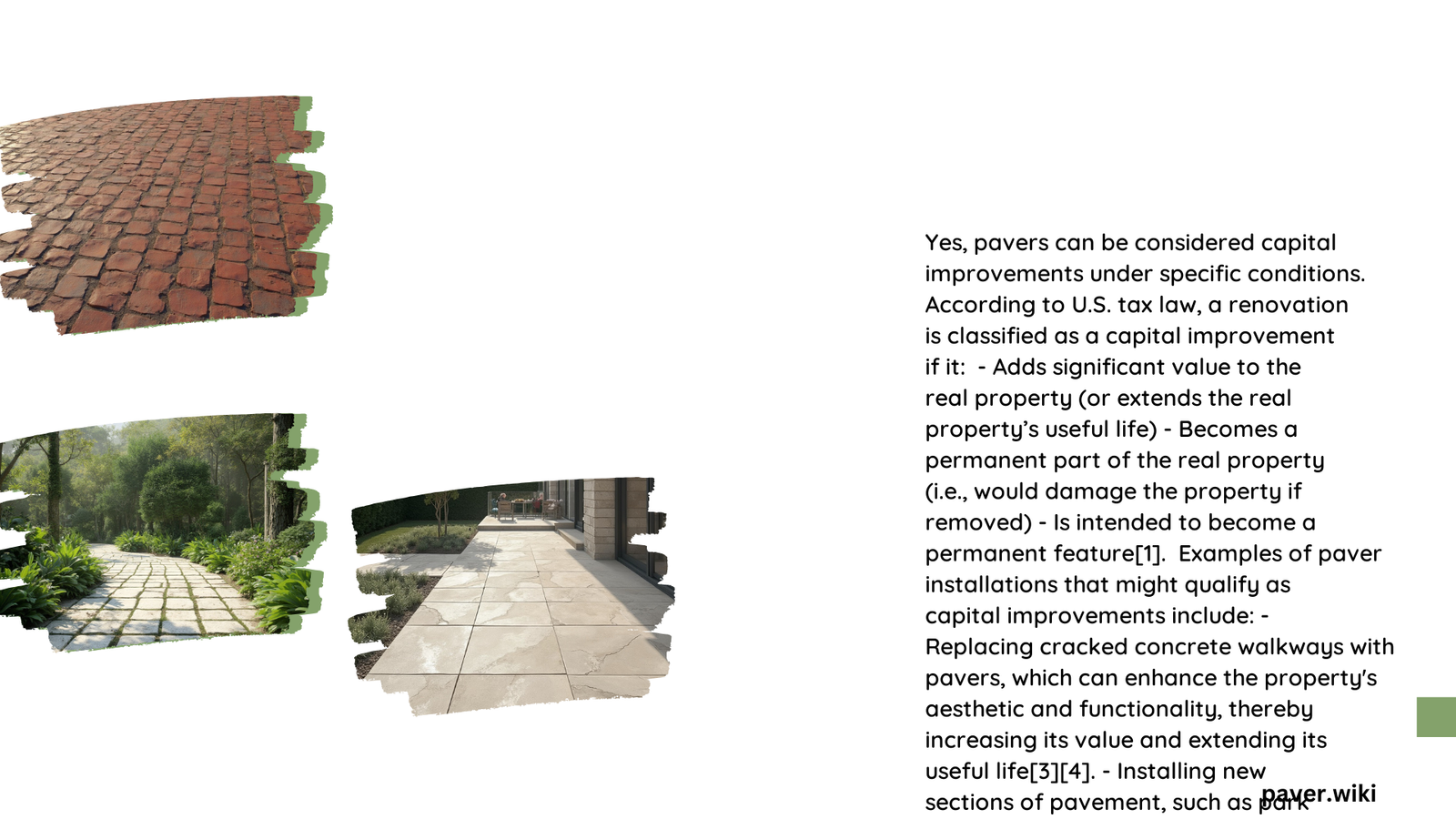Pavers are often considered capital improvements due to their ability to enhance property value, extend useful life, and adapt spaces for new uses. This classification has significant implications for property owners, particularly in terms of tax benefits and long-term investment strategies. Understanding whether pavers qualify as capital improvements is crucial for homeowners and real estate investors alike, as it affects financial planning and property valuation.
What Qualifies Pavers as Capital Improvements?
Pavers can be classified as capital improvements if they meet specific criteria set by the Internal Revenue Service (IRS). These criteria include:
- Adding substantial value to the property
- Prolonging the useful life of the property
- Adapting the property to new or different uses
Installing pavers for driveways, walkways, or patios often meets these criteria, as they can significantly enhance the property’s aesthetic appeal, functionality, and overall value.
How Do Tax Implications Affect Paver Installations?

When pavers are classified as capital improvements, they have several tax implications:
- The cost of installation must be capitalized and added to the property’s cost basis
- This increased cost basis can potentially reduce the taxable capital gain when the property is sold
- Unlike regular repairs, capital improvements are not immediately tax-deductible
For example, if you spend $15,000 on a paver installation project, this amount would be added to your property’s original purchase price, potentially reducing your capital gains tax liability when you sell the property in the future.
What Are the Cost Considerations for Paver Installations?
Understanding the costs associated with paver installations is crucial for property owners considering this improvement. Here’s a breakdown of typical expenses:
| Cost Component | Price Range (per square foot) |
|---|---|
| Concrete Pavers | $3 – $10 |
| Brick Pavers | $5 – $15 |
| Natural Stone Pavers | $10 – $30 |
| Labor | $5 – $15 |
| Site Preparation | $2 – $5 |
| Drainage Considerations | $1 – $3 |
Total installation costs can range from $8 to $25 per square foot, depending on the materials chosen and specific site requirements.
How Should Pavers Be Maintained to Preserve Their Value?
To maintain the value of your paver investment and ensure it continues to qualify as a capital improvement, regular maintenance is essential. Here are some key maintenance tips:
- Clean pavers at least twice a year
- Use mild detergents and avoid harsh chemicals
- Seal pavers every 2-3 years (cost: $0.50 to $2.00 per square foot)
- Address repairs promptly:
- Minor issues: Re-sand and re-seal
- Major problems: Replace individual pavers ($5 to $20 per paver)
What Are the Durability Ratings for Different Paver Materials?
The durability of pavers varies depending on the material used. Here’s a comparison:
- Concrete Pavers
- Lifespan: 20-30 years
- Weather Resistance: Good
-
Load-Bearing Capacity: Moderate to high
-
Brick Pavers
- Lifespan: 30-50 years
- Weather Resistance: Excellent
-
Load-Bearing Capacity: High
-
Natural Stone Pavers
- Lifespan: 50+ years
- Weather Resistance: Excellent
- Load-Bearing Capacity: Very high
How Do Pavers Compare to Other Capital Improvements?
When considering pavers as a capital improvement, it’s helpful to compare them to other common property enhancements:
- Kitchen Remodeling
- Average Cost: $25,000 – $65,000
-
ROI: 60-80%
-
Bathroom Renovation
- Average Cost: $10,000 – $30,000
-
ROI: 60-70%
-
Paver Installation (e.g., patio or driveway)
- Average Cost: $5,000 – $30,000 (depending on size and materials)
- ROI: 50-75%
While pavers may have a lower upfront cost compared to major interior renovations, they can offer comparable returns on investment and have the added benefit of enhancing outdoor living spaces.
What Are the Long-Term Benefits of Paver Installations?
Investing in pavers as a capital improvement can yield several long-term benefits:
- Increased property value
- Enhanced curb appeal
- Improved outdoor functionality
- Reduced maintenance compared to some alternatives (e.g., asphalt driveways)
- Potential for lower capital gains taxes upon property sale
How Do Local Regulations Affect Paver Installations?
Before undertaking a paver installation project, it’s important to consider local regulations:
- Check with your local building department for permit requirements
- Some areas may have restrictions on impervious surface coverage
- Homeowners’ associations may have guidelines on paver styles and colors
Compliance with local regulations ensures that your paver installation remains a valid capital improvement and avoids potential legal issues.
What Should Property Owners Consider Before Installing Pavers?
Before proceeding with a paver installation, property owners should consider:
- Budget constraints and potential return on investment
- Long-term maintenance requirements
- Compatibility with existing landscaping and architecture
- Climate considerations (e.g., freeze-thaw cycles in colder regions)
- Professional installation vs. DIY options
By carefully evaluating these factors, property owners can make informed decisions about paver installations as capital improvements.
References:
1. Investopedia – What Is a Capital Improvement, and How Does It Work?
2. The Tax Adviser – Capitalized improvements vs. deductible repairs
3. Homelight – What is Considered a Capital Improvement on a Home vs. a Repair?
